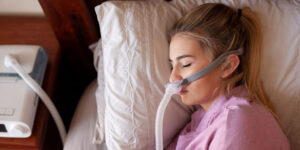Sleep Apnea: Symptoms, Causes, and Treatments
Understanding Sleep Apnea: Signs, Causes, and Effective Treatments
What is Sleep Apnea?
Sleep apnea is a sleep disorder characterized by repeated interruptions in breathing during sleep. These pauses, called apneas, can last several seconds and occur multiple times per hour, leading to fragmented and poor-quality sleep.
Symptoms of Sleep Apnea
The most common signs of sleep apnea include:
- Loud snoring
- Waking up gasping for air
- Excessive daytime sleepiness
- Morning headaches
- Difficulty concentrating
- Irritability and mood swings
If you or a loved one experience these symptoms, it is essential to seek medical advice. Source « Dormir sans ronler » French’s sources 2025@

Main Causes of Sleep Apnea
Several factors can contribute to sleep apnea:
- Obesity: Excess weight increases the risk of airway obstruction.
- Anatomical factors: A narrow airway, large tonsils, or a thick neck can restrict airflow.
- Smoking and alcohol: These substances relax throat muscles, increasing the likelihood of airway collapse.
- Genetics: A family history of sleep apnea can increase the risk.
- Aging: Muscle tone decreases with age, which can contribute to breathing interruptions.
Types of Sleep Apnea
There are three main types:
- Obstructive Sleep Apnea (OSA): The most common type, caused by airway blockage.
- Central Sleep Apnea (CSA): Due to brain signal failures controlling breathing.
- Mixed or Complex Sleep Apnea: A combination of OSA and CSA.
Health Risks Associated with Sleep Apnea
Untreated sleep apnea can lead to serious health complications:
- High blood pressure
- Increased risk of heart disease and stroke
- Type 2 diabetes
- Depression and anxiety
- Reduced cognitive function
Effective Treatments for Sleep Apnea
Several solutions can help manage sleep apnea:
- Lifestyle Changes: Weight loss, sleeping on your side, and avoiding alcohol before bed.
- CPAP Therapy: A machine that delivers continuous air pressure to keep airways open.
- Oral Appliances: Devices that adjust jaw position to improve airflow.
- Surgery: In severe cases, procedures may be recommended to remove obstructions.
Conclusion
Sleep apnea is a serious condition that can significantly impact health and quality of life. Identifying symptoms early and seeking appropriate treatment can improve sleep and overall well-being. If you suspect sleep apnea, consult a specialist to find the best solution.










